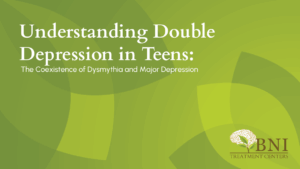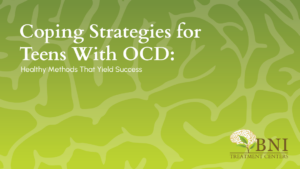Because parents have a deep love for their children, it is difficult to acknowledge signs that something is not right with their teenager. Falling back on memories of their own angst-ridden adolescence to explain troubling moods and behaviors expressed by their teenager, parents prefer to accept such changes as normal for the age.
The statistics for teens that experience major depression in a given year are sobering. According to the National Institute of Mental Health, teen depression is quite prevalent in the United States, with an estimated 5 million adolescents suffering a major depressive episode in 2021, or 20.1% percent of kids between the ages of 12-17. Depression in young people can have serious consequences and prolonged symptoms should not be ignored in hopes that they will pass.
Teens who express angry or violent outbursts may be revealing the signs of a behavior disorder like conduct disorder, or the anger may be an indication of depression. Conduct disorder features aggressive, defiant, and hostile behaviors and is more prevalent in male teens. Adolescents with conduct disorder will be dismissive of rules and boundaries, and disruptive in school or social settings. These teens display no remorse for their behavior, nor do they take responsibility for their actions. If a teen exhibits anger without these features, then it is more likely a symptom of depression.
When Teen Moodiness is Not Just Moodiness
Yes, adolescence is a time of emotional upheaval. Hormone fluctuations and ordinary coming of age dramas can wreak havoc on the normally stable landscape of your child’s life. But there is a distinct difference between normal mood fluctuations and behaviors commonly experienced by teens, and the serious mental health disorder of depression. Signs of teen depression can include:
- Prolonged feelings of sadness, which can include intermittent crying spells for no apparent reason
- Agitation or restlessness; inability to sit still
- Feelings of hopelessness or a sense of emptiness
- Irritable or annoyed mood, anger
- Lack of energy; apathy
- Use of alcohol or drugs
- Sleep disturbances, either difficulty getting or staying asleep or sleeping excessively
- Feelings of frustration, even over small matters
- Loss of interest or pleasure in activities once enjoyed
- Neglecting family and friends; isolation
- Low self-esteem
- Neglected appearance
- School performance suffers
- Feelings of worthlessness or guilt
- Fixation on past failures or exaggerated self-blame or self-criticism
- Extreme sensitivity to rejection or failure, and the need for excessive reassurance
- Trouble concentrating, making decisions and remembering things
- Ongoing sense that life and the future are grim and bleak
- Frequent thoughts of death, dying or suicide; self harm
Although the severity of these symptoms may vary from teen to teen, a cluster of these behaviors and symptoms should result in a thorough evaluation of both physical and emotional health.
Teenage Anger Issues
Adolescents who exhibit increasingly aggressive, hostile, or violent behavior towards others may be struggling with a mood disorder like depression, or a behavior problem such as conduct disorder. When a teen displays symptoms of a mental health issue, he or she should be evaluated by the family physician first and then possibly by a psychotherapist or psychiatrist.
Adolescents who are challenged in managing their frustrations and anger may benefit from acquiring some anger copings skills, which can be taught through individual and family therapy sessions. These coping strategies may be all that are needed to help the teen learn to navigate their impulsive tendencies toward expressing frustration, and channel them in a more socially appropriate manner.
The limbic region of the brain is the area that regulates executive functions. This region can be underdeveloped in teens, impacting how they manage judgment, emotions, decision-making, and self-control. Kids whose brains are still developing may lash out in anger when they feel slighted, disappointed, or frustrated, lacking coping skills that are yet to be developed. Some signs of undeveloped executive functions include:
- Exhibits emotional outbursts, like anger and rage
- Gets into heated arguments, both at school or at home with family members
- Bullies others
- Is difficult to reason with
- Engages in relationship violence
- Makes verbal threats
- May be cruel to animals, younger siblings
- Excessive arguing
- Destroys property
- Displays symptoms of depression, self-harming behaviors
- Exhibits physical violence towards others
Parents have an important role in setting rules and boundaries for appropriate conduct in the home and elsewhere. Consistent enforcement will send a message to the teen that hostile behavior is unacceptable. Parents can equip their adolescent with anger management skills that will give them more positive methods of managing anger.
Red Flag Warnings of a Teen’s Mental Distress
Teen mood disorders can be a serious mental health condition that should not be ignored. Teen suicides have increased dramatically in recent years, now being the second leading cause of death for ages 10-24, according to the Centers for Disease Control.
So, how does a parent know when their teen’s moodiness has crossed the line into a serious mental health threat? When a psychiatric crisis is unfolding the teen may exhibit the following signs of emotional distress:
- Aggressive or violent behavior
- Loss of interest in social and extracurricular activities
- Running away from home
- Skipping school
- Extreme sadness or despair
- Engages in illegal or risky behaviors
- Repeated truancy
- Extreme irritability, agitation
- Sleep disruptions
- Isolating behavior, secretive behavior
- Sudden decline in academic performance
- Self-harming behavior
- Substance abuse
- Suicidal ideation, threats of suicide
The presence of a depressive disorder in your son or daughter is something to take action on. Clinical depression involves symptoms that persist for more than two weeks. Depression can increase the risk of suicide by 12-fold, especially when one of the depression symptoms is hopelessness. Additionally, conduct disorder is linked to a third of adolescent suicides in boys.
When a teen is experiencing severe depression, a residential program like our depression treatment center near Los Angeles will provide an intensive approach involving evidence-based therapies.
Residential Mental Health Programs for Teenage Anger and Depression
Because untreated mood disorders can affect all facets of a young person’s life, parents, teachers, and youth leaders should not hesitate to address their concerns about the depressed and angry teen. Open communication is important in gaining a general understanding of the issues that may be at play in the teen’s life, and can lead to getting the necessary help to treat teenage anger and depression.
Teens who experience the signs and symptoms of depression need to be under the care of a mental health professional. Teen residential mental health programs are the appropriate level of care for adolescents with persistent or deteriorating depressive disorder or other serious mental health issues that have not been adequately resolved through outpatient care. The residential setting offers teens a safe and supportive environment for healing where they can take a break from the stressors in daily life that trigger the anger or depression. These teen-specific mental health programs offer the following treatment elements:
- Psychotherapy. This is offered in both individual and group formats and may include cognitive behavioral therapy, mindfulness-based cognitive therapy, solutions-focused therapy, and integrated body therapy. Therapy focuses on making behavioral changes, such as shifting negative thought patterns toward positive ones.
- Psychosocial education. Clinicians will teach the teen coping skills, communication skills, conflict resolution techniques, and interpersonal skills.
- Antidepressants. Some teens may benefit from antidepressant drug therapy, although the risks must be carefully weighed. Some young people have an adverse reaction to antidepressants that may result in suicidal thoughts.
- Experiential activities. Complementary activities enhance clinical results, such as surf therapy, equine therapy, recreational therapy, art, dance, music, and drama therapy, yoga, and various outdoor activities.
When teenage anger and depression are consistently present in your adolescent, it is essential that he or she be evaluated. Depression is highly treatable. As well, teens with anger issues can adopt coping skills to help them manage their emotions.
BNI Treatment Centers Leading Teen-Specific Mental Health Treatment Program
BNI Treatment is a psychiatrist-owned and operated inpatient mental health treatment center that serves children ages 12-17 in Southern California. BNI Treatment specializes in treating adolescents with mental health disorders that would benefit from intensive intervention. For more information, please contact BNI today at (888) 522-1504.



